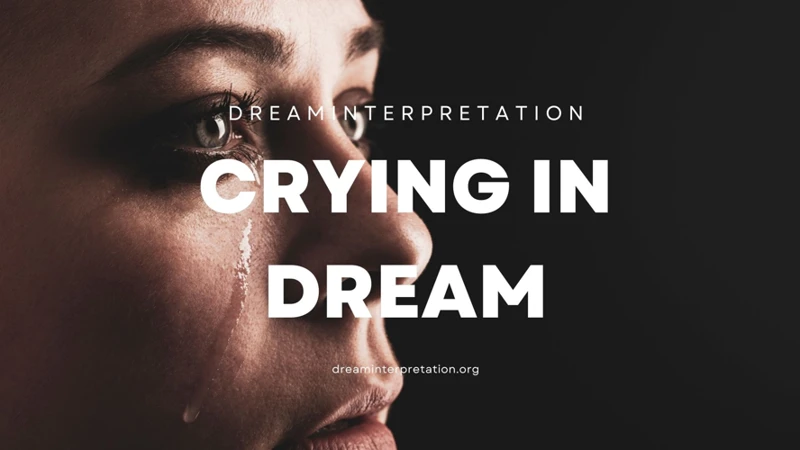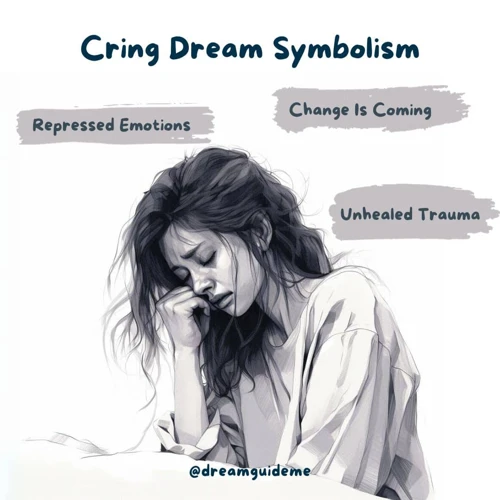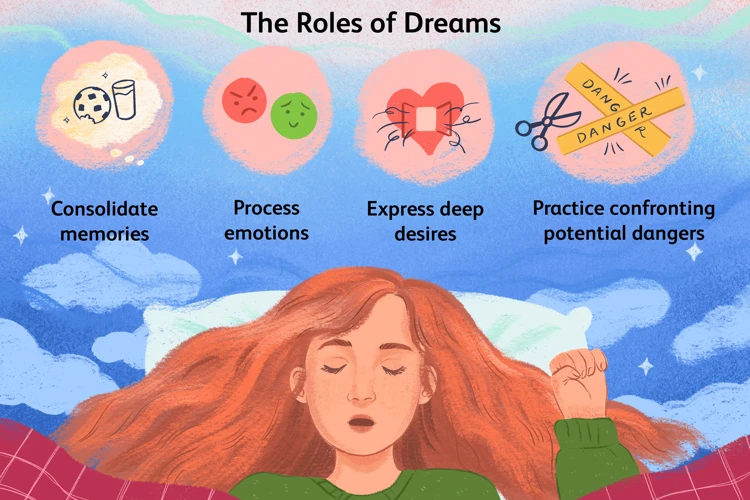Have you ever woken up from a dream with tears streaming down your face? The perplexing world of dreams has long fascinated human beings, and the act of crying within our dreams is no exception. What could it possibly mean when we find ourselves weeping in the realm of our subconscious? In this article, we will delve into the symbolic interpretations and psychological explanations behind the act of crying in dreams. From tears of joy to tears of pain, we will explore the various types of crying dreams and their possible meanings. So, grab a tissue and prepare to uncover the hidden messages behind your nighttime tears.
Why Do We Cry in Our Dreams?

Why do we cry in our dreams? This mysterious phenomenon evokes a range of emotions and leaves us pondering its significance. While there isn’t a definitive answer, experts have put forth various theories to explain this phenomenon. One possibility is that crying in dreams serves as a form of emotional release, allowing us to process and cope with our feelings while we sleep. Another explanation lies in unresolved grief or sadness that manifests in our dreams, providing an opportunity for healing and closure. Additionally, crying in dreams can also be seen as a symbolic representation, where the act of shedding tears represents deeper psychological or emotional meanings. The interpretation of crying dreams can be complex, and understanding their underlying messages can offer valuable insights into our subconscious minds.
1. Emotional Release
One possible explanation for crying in dreams is that it serves as a means of emotional release. Dreams often provide a safe space for us to process and express our deepest emotions. When we cry in our dreams, it can be a cathartic experience, allowing us to release pent-up feelings that may be weighing us down in our waking lives. This emotional release can be liberating, providing a sense of relief and allowing us to move forward with a lighter heart. Crying in dreams may signify the need for emotional healing or the acknowledgment of suppressed emotions. It is important to pay attention to the specific context and emotions surrounding the crying in order to gain a deeper understanding of its significance. So, if you find yourself shedding tears in your dreams, take a moment to reflect on your emotions and consider whether there are unresolved feelings that need your attention.
2. Unresolved Grief or Sadness
Unresolved grief or sadness is another possible explanation for why we cry in our dreams. Dreams have a way of bringing suppressed emotions to the surface, and unresolved grief or sadness may resurface during these subconscious moments. These dreams can serve as a means of catharsis, allowing us to confront and process our unresolved feelings, even if we may not be consciously aware of them. It’s important to pay attention to the specific details and emotions present in these dreams, as they could hold valuable clues to help us navigate our own healing journeys. If you frequently dream about unresolved grief or sadness, it may be beneficial to seek support from a therapist or counselor to work through these emotions and find closure.
3. Symbolic Representation
Symbolic representation is another key aspect of crying dreams. Tears shed in dreams can hold deeper meanings beyond the surface level. They can symbolize a range of emotions and experiences in our waking lives. For example, crying in a dream may represent feelings of sadness, grief, or loss that we may be suppressing or not fully acknowledging. It could also signify a need for emotional release or catharsis, allowing us to let go of pent-up emotions or past traumas. Dreams are often rich in symbolism, and interpreting the specific symbolism of crying in dreams can provide valuable insights into our subconscious thoughts and emotions. Understanding the symbolic representation of crying dreams can shed light on the hidden messages and unresolved issues we may need to address in our waking lives.
Interpreting Different Types of Crying Dreams

Interpreting different types of crying dreams can provide valuable insights into our subconscious thoughts and emotions. One type of crying dream is tears of joy, where the overwhelming sense of happiness and fulfillment manifests through tears. On the other hand, tears of sadness or pain may be a reflection of unresolved emotional trauma or deep-seated sadness that needs to be addressed. Silent tears or the inability to cry in a dream may indicate suppressed emotions or a struggle with expressing oneself. Crying out loud in a dream might signify a need for attention or a call for help. Continuous weeping dreams could suggest a prolonged period of grief or a sense of being overwhelmed by emotions. Each type of crying dream offers a unique glimpse into our inner world and can guide us towards a better understanding of ourselves.
1. Tears of Joy
When we experience tears of joy in our dreams, it can be a truly uplifting and euphoric experience. These dreams often symbolize moments of immense happiness, accomplishment, or relief. It could be a reflection of positive events in our waking life, such as achieving a long-awaited goal, receiving good news, or reconnecting with a loved one. These dreams can serve as a reminder to cherish and appreciate the moments of joy and fulfillment in our lives. They can also provide a sense of hope and encouragement during challenging times. So, if you find yourself shedding tears of joy in your dreams, embrace the happiness and let it inspire you to seek more moments of bliss in your waking life.
2. Tears of Sadness or Pain
Tears of sadness or pain in dreams can evoke a powerful emotional response. When we experience these types of crying dreams, it may signify deep-seated emotional turmoil or unresolved issues in our waking lives. The tears shed in these dreams can represent the release of pent-up sadness, grief, or even physical pain. It’s essential to pay attention to the context of the dream and any accompanying symbols or scenarios to gain a more profound understanding of its meaning. Whether it reflects a recent loss, a painful experience, or a lingering emotional wound, exploring the underlying emotions can provide valuable insight into our subconscious struggles and help us address them in our waking lives.
3. Silent Tears or Inability to Cry
Silent tears or the inability to cry in dreams can be a perplexing experience. In these dreams, we may find ourselves in emotionally charged situations, yet no tears stream down our face or our cries are devoid of sound. This type of dreaming can signify a suppression of emotions or a difficulty in expressing ourselves fully. It may reflect a need to confront and release pent-up feelings that we may be consciously or unconsciously holding back. The inability to cry in dreams could also point to a sense of powerlessness or an internal struggle to convey our emotions effectively. Exploring the underlying reasons behind these dreams can provide valuable insights into our emotional well-being and help us address any unresolved issues. So, if you find yourself silently shedding tears or being unable to cry in your dreams, it might be worth exploring the deeper meanings behind these experiences.
4. Crying Out Loud
Crying out loud in your dreams is a vivid and intense experience that can leave you feeling emotionally overwhelmed upon waking. This type of crying dream often occurs when the emotions you are suppressing in your waking life become too overwhelming to contain. It could be a sign that you need to release your pent-up emotions and express yourself more freely. Additionally, crying out loud can also symbolize a cry for help or a desperate need for attention in some aspect of your life. It’s important to reflect on the context of the dream and the emotions you are experiencing to gain a deeper understanding of its meaning. Exploring the underlying emotions and addressing any unresolved issues may help alleviate the intensity of these dreams.
5. Continuous Weeping
5. Continuous Weeping:
In some dreams, we may find ourselves continuously weeping, unable to control our tears. This persistent display of sorrow can be indicative of repressed emotions or unresolved grief in our waking lives. It may signify a deep-seated sadness that we have been suppressing or ignoring. This crying dream could be a subconscious reminder that it is necessary for us to confront and process these emotions in order to find healing and closure. It might be helpful to seek support from loved ones or even consider speaking with a therapist to explore those underlying feelings and facilitate emotional release.
Common Dreamscapes and Crying Interpretations

Common dreamscapes can provide valuable insights into the interpretation of crying dreams. Here are a few scenarios and their possible meanings:
1. Crying in a Crowd: Finding yourself shedding tears amidst a crowd may signify feeling overwhelmed by the pressures and expectations of others. It could be a reflection of a need for individuality and a desire to express your true emotions.
2. Crying Alone in a Dark Room: This dream setting often symbolizes a sense of loneliness or isolation. You may be experiencing emotional pain or struggling with unresolved issues in your waking life. It could be an indication that you need to seek support or address these inner struggles.
3. Crying and Being Comforted: In this dream, being comforted while crying suggests that you are seeking solace and emotional support in your waking life. It could represent a longing for reassurance and a need for someone to understand your feelings.
4. Comforting Someone Who is Crying: Being in the role of a comforter implies empathy and a nurturing nature. It may indicate your ability to provide emotional support to others or a desire to heal and offer assistance in real-life situations.
Understanding the specific dreamscapes in which crying occurs can provide insights into the emotions and circumstances surrounding these dreams. Remember, dream interpretation is highly personal, and it’s essential to consider your unique experiences and emotions when analyzing your dreams.
1. Crying in a Crowd
Crying in a crowd is a common dream scenario that can carry significant symbolism. When we find ourselves shedding tears in a crowd, it may indicate feelings of vulnerability or being overwhelmed by external pressures. This dream could reflect a sense of loneliness or not being understood, despite being surrounded by people. It may also point to a desire for emotional connection or a need for support in challenging situations. Crying in a crowd could suggest a fear of judgment or an inability to express oneself authentically in a social setting. Exploring these emotions and seeking opportunities for self-expression and connection can help unravel the deeper meaning behind this dream.
2. Crying Alone in a Dark Room
Crying alone in a dark room is a common dream scenario that can evoke feelings of isolation and sadness. When we find ourselves sobbing in this setting, it may signify a deep sense of loneliness or despair that we are experiencing in our waking lives. The dark room symbolizes a lack of clarity or understanding, where we feel lost and overwhelmed by our emotions. It is important to reflect on the context of this dream and examine any underlying issues that may be contributing to these feelings. Exploring our own emotions, seeking support from others, or engaging in self-reflection can help illuminate the path towards healing and finding a sense of connection amidst the darkness.
3. Crying and Being Comforted
In some dreams, we find ourselves crying and being comforted. This particular dream scenario often signifies a need for emotional support and reassurance in our waking lives. It may reflect feelings of vulnerability, loneliness, or a desire for connection. Being comforted in a dream reminds us that we are not alone and that there are people or resources available to help us through challenging times. This dream can also suggest the importance of seeking comfort and support in our daily lives instead of bottling up our emotions. Explore your relationships and support systems to ensure you have a strong network to rely on when needed. Remember, seeking comfort is not a sign of weakness; it is a natural human need that fosters healing and growth.
4. Comforting Someone Who is Crying
Comforting someone who is crying is a common theme in dreams and can hold significant symbolism. It may represent our compassionate and nurturing nature, reflecting our desire to provide emotional support to others. This dream scenario can also signify our own need for comfort and reassurance during challenging times. It could be a manifestation of unresolved emotions or subconscious desires to heal and find solace. By examining the context of the dream and the relationship with the person being comforted, we can gain a deeper understanding of the specific emotions and experiences that are being addressed. Understanding the underlying meaning of comforting someone who is crying in our dreams can offer valuable insights into our own emotional well-being and the dynamics of our relationships.
What Can Crying Dreams Tell Us?
What can crying dreams tell us? These emotional experiences while we sleep can offer valuable insights into our subconscious minds and provide clues about our emotions, thoughts, and experiences. Here are some possible interpretations of crying dreams:
1. Processing Emotions: Crying dreams may indicate that we are in need of emotional release and that our subconscious is attempting to process and reconcile overwhelming feelings or experiences.
2. Unresolved Issues: They can also be a sign of unresolved grief or sadness, suggesting that there are unresolved issues in our waking lives that require attention and healing.
3. Symbolic Meanings: Crying dreams can have symbolic meanings as well. The act of shedding tears may represent feelings of vulnerability, a need for emotional support, or a desire for catharsis.
4. Personal Reflection: Crying dreams can also serve as a mirror of our emotional well-being, reflecting our current state of mind, and highlighting areas where we may need to focus on self-care or seek support.
While the specific interpretation of crying dreams may vary for each individual, paying attention to the emotions and themes experienced in these dreams can provide valuable insights and serve as a guide for personal growth and self-reflection. So, the next time you find yourself shedding tears in the realm of dreams, take a moment to reflect on what your subconscious might be telling you.
Note: Visit this link for more information on why-do-i-always-dream-about-my-ex.
Conclusion
In conclusion, crying in our dreams is a complex and intriguing phenomenon. Whether it serves as an emotional release, represents unresolved grief, or holds symbolic meanings, these nighttime tears can provide valuable insights into our subconscious minds. By exploring the different types of crying dreams and their interpretations, we can gain a deeper understanding of our emotions and experiences. If you find yourself frequently dreaming about crying or are curious about other dream-related topics, such as why you always dream about your ex or the meaning behind dreaming about losing teeth, be sure to check out our other informative articles. Our dreams hold a wealth of hidden messages just waiting to be unraveled.
Frequently Asked Questions
1. Why do we sometimes wake up crying after a dream?
Waking up crying after a dream can occur when the emotions experienced during the dream linger into our waking state. Dreams can evoke intense emotions, and when we wake up, it may take a moment for our brain to process that the dream was not real and for the emotions to dissipate.
2. Are crying dreams always negative or sad in nature?
No, not all crying dreams are negative or sad. While crying dreams can often be associated with sadness or pain, they can also represent other emotions such as joy, relief, or even catharsis. The underlying context and symbolism can provide further insight into the specific emotion being expressed.
3. Can crying dreams provide insight into unresolved issues in our lives?
Yes, crying dreams can be a source of insight into unresolved issues or unprocessed emotions in our lives. They may bring to the surface feelings or experiences that we have not fully dealt with, allowing us an opportunity to address and heal from them.
4. What if I can’t physically cry in my dreams?
Not being able to physically cry in your dreams does not diminish the emotional significance behind the act of crying. In some cases, the inability to cry in a dream may symbolize suppressed emotions or difficulty expressing oneself emotionally in waking life.
5. Are there any cultural or societal interpretations of crying dreams?
Yes, interpretations of crying dreams can vary across cultures and societies. In some cultures, crying dreams might be seen as a sign of impending joy or celebration, while in others, they may signify the need for emotional healing or the release of pent-up emotions.
6. Can recurring crying dreams have a deeper meaning?
Recurring crying dreams could suggest that there is a persistent emotional issue that needs attention or resolution. It may be beneficial to explore the recurring themes and emotions within these dreams to gain a deeper understanding of the underlying message.
7. How can I differentiate between a symbolic crying dream and a reflection of real-life emotions?
Differentiating between a symbolic crying dream and a reflection of real-life emotions can be challenging. Pay attention to the context and symbolism in the dream, as well as any emotions or unresolved issues you may be grappling with in your waking life, to help interpret the dream more accurately.
8. Can crying dreams be therapeutic?
Yes, crying dreams can have a therapeutic effect. They provide an avenue for emotional release and can help us process difficult emotions or experiences. Crying in dreams can be a way for our subconscious mind to work through and heal from emotional wounds.
9. Is there a way to control or influence the content of crying dreams?
While we cannot have complete control over the content of our dreams, keeping a dream journal and practicing relaxation techniques before sleep may increase our chances of experiencing dreams that are more self-reflective and emotionally significant.
10. Should I be concerned if I frequently cry in my dreams?
Frequent crying in dreams is typically not a cause for concern. However, if the dreams or emotions associated with them are consistently distressing or interfere with your daily life, it may be beneficial to seek support from a mental health professional.







